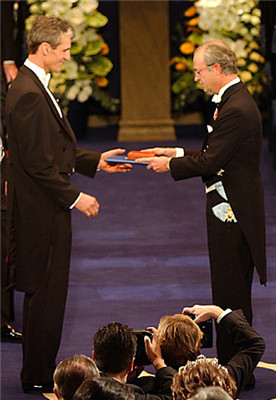(单词翻译:单击)
Nobel laureates sometimes display as much ingenuity when deciding how to spend their prize money as they did on the work that won them the award in the first place.
有的诺贝尔奖得主使用奖金的方式就像他们的获奖作品一样匠心独运。
When Sir Paul Nurse won the Nobel Prize for Medicine in 2001, he decided to upgrade his motorbike. A fellow winner in 1993, Richard Roberts, installed a croquet lawn in front of his house. Austrian author Elfriede Jelinek, who won in 2004, said the prize meant "financial independence."
2001年获得诺贝尔医学奖后,保罗·纳斯爵士决定升级摩托车。1993年诺贝尔医学奖得主之一理查德·罗伯茨在家门口铺了一个槌球草坪。2004年诺贝尔文学奖得主、奥地利作家埃尔弗里德·耶利内克表示,奖金意味着“财务独立”。

Lars Heikensten, executive director of the Nobel Foundation, said there were no obvious shopping trends among laureates.
诺贝尔奖基金会执行董事拉斯·黑肯斯坦表示,诺奖得主没有明显的消费趋势。
"I think it depends a lot on which country they come from, their personal finances... what kind of incomes they have when they get the prize, and where they are in life," he said.
“我认为,这在很大程度上取决于他们来自哪国、个人财务状况如何……获奖时收入怎样、生活状况如何,”他说。
Real estate, however, is a popular option, at least among those willing to reveal what they spend the money on.
然而,房地产是个受欢迎的选择,至少在那些愿意透露花钱方式的得主中是这样。
Over a million dollars sounds like a lot but it is often shared between several winners, diluting their Nobel spending power.
一百多万美元的奖金听起来很多,但往往是几个得主共享,分摊后能花的就不多了。
Wolfgang Ketterle at the Massachusetts Institute of Technology, who shared the 2001 physics prize with two colleagues, put his share towards a house and his children's education.
麻省理工学院物理学教授沃夫冈·克特勒与两位同事平分了2001年诺贝尔物理学奖,他用自己那份奖金买了栋房子,剩下的则用作孩子的教育资金。
"Since half goes to taxes in the US, there was nothing (more) left," he said.
“因为一半奖金在美国交了税,剩下的就没(多少)了,”他说。
Phillip Sharp, the American co-winner of the 1993 medicine prize, decided to splash out on a 100-year-old Federal style house.
美国的菲利普·夏普是1993年诺贝尔医学奖得主之一,他用大笔奖金买了幢有百年历史的联邦风格别墅。
"I took that money and bought a little bit bigger house... It's a beautiful old place," he told AFP, adding that "The money is a nice part of the process" but "the important thing about the prize is the recognition."
“我拿到那笔钱,然后就买了幢大点的别墅……真是个漂亮的老房子,”他告诉法新社记者。他还说:“奖金是这个奖项的美妙之处,但重要的是,这个奖是一种认可。”
For winners of the peace prize the decision is often more clear-cut, as the honour tends to go to politicians, organisations and activists who are under more public scrutiny.
对于和平奖得主,奖金的去向则比较明确,因为得奖的往往是公众关注比较多的政治家、组织和活动家。
Many, like US President Barack Obama in 2009 and the European Union in 2012, donate to charities.
许多得主都将奖金捐赠给慈善机构,比如2009年获奖的美国总统奥巴马以及2012年获奖的欧盟。
Others support pet projects: the 2008 winner, former Finnish president Martti Ahtisaari, said he would finance a conflict resolution group he had set up.
也有人用在个人偏爱的项目上:2008年的得主、芬兰前总统马尔蒂·阿赫蒂萨里表示,他将资助自己成立的一个冲突化解组织。
But there has been one notable exception to the charitable giving.
但这项奖金也有个用于慈善之外的著名案例。
Former US president Woodrow Wilson won the prize in 1920 but left it in a Swedish bank to earn interest, apparently because he was concerned about life after retirement in an age when former presidents got no government pension, according to one biography.
美国前总统伍德罗·威尔逊赢得了1920年的大奖,但把奖金存进了瑞典银行生利息,根据一本传记的观点,他这么做显然是因为担心退休后的生活,因为在那个年代,总统退休后没有政府养老金。
Literature laureates tend to be more private about how they use the money, but the choice is often equally straightforward.
文学奖得主往往不会公开奖金使用方式,但他们的选择通常也很明确。
"Even if Nobel-winning authors are quite well known, many of them will not have made much money from writing," said Anna Gunder, a Nobel literature expert at Uppsala University.
“虽然获得诺贝尔奖的作家都颇有名气,但很多人没靠写作赚到钱,”瑞典乌普萨拉大学的诺贝尔文学专家安娜·甘德说。
While the prize might keep the wolf from the door for some years, giving them freedom to write, it can also briefly have the opposite effect.
虽然奖金能让他们过几年衣食无忧的生活,令他们能自由写作,但也可能在短时期内产生相反效果。
"It really changes their careers... During the first year after they've won they often write less, but they generally continue after a year or two," said Gunder.
“奖金真的会改变他们的职业生涯……得奖后一年内,他们的写作量往往会降低,但通常一两年后就会恢复正常,”甘德说。


